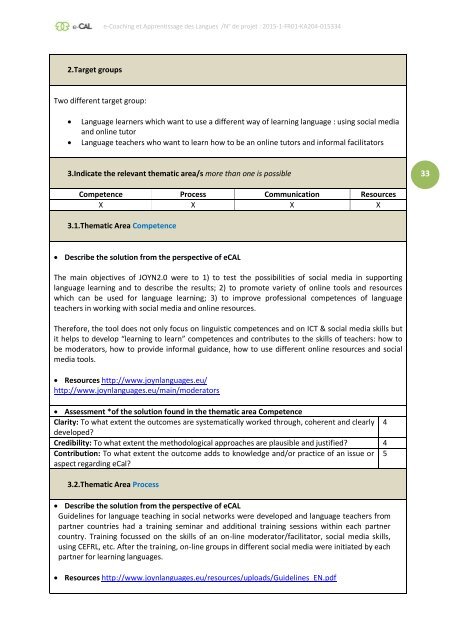e-CAL - e-Coaching et Apprentissage des Langues
The ERASMUS+ project e-CAL presents the result of an analysis of support methods in the case of language learning using web-based Open Educational Resources (OER).
The ERASMUS+ project e-CAL presents the result of an analysis of support methods in the case of language learning using web-based Open Educational Resources (OER).
You also want an ePaper? Increase the reach of your titles
YUMPU automatically turns print PDFs into web optimized ePapers that Google loves.
e-<strong>Coaching</strong> <strong>et</strong> <strong>Apprentissage</strong> <strong>des</strong> <strong>Langues</strong> /N° de proj<strong>et</strong> : 2015-1-FR01-KA204-015334<br />
2.Targ<strong>et</strong> groups<br />
Two different targ<strong>et</strong> group:<br />
<br />
<br />
Language learners which want to use a different way of learning language : using social media<br />
and online tutor<br />
Language teachers who want to learn how to be an online tutors and informal facilitators<br />
3.Indicate the relevant thematic area/s more than one is possible<br />
33<br />
Comp<strong>et</strong>ence Process Communication Resources<br />
X X X X<br />
3.1.Thematic Area Comp<strong>et</strong>ence<br />
Describe the solution from the perspective of e<strong>CAL</strong><br />
The main objectives of JOYN2.0 were to 1) to test the possibilities of social media in supporting<br />
language learning and to <strong>des</strong>cribe the results; 2) to promote vari<strong>et</strong>y of online tools and resources<br />
which can be used for language learning; 3) to improve professional comp<strong>et</strong>ences of language<br />
teachers in working with social media and online resources.<br />
Therefore, the tool does not only focus on linguistic comp<strong>et</strong>ences and on ICT & social media skills but<br />
it helps to develop “learning to learn” comp<strong>et</strong>ences and contributes to the skills of teachers: how to<br />
be moderators, how to provide informal guidance, how to use different online resources and social<br />
media tools.<br />
Resources http://www.joynlanguages.eu/<br />
http://www.joynlanguages.eu/main/moderators<br />
Assessment *of the solution found in the thematic area Comp<strong>et</strong>ence<br />
Clarity: To what extent the outcomes are systematically worked through, coherent and clearly 4<br />
developed?<br />
Credibility: To what extent the m<strong>et</strong>hodological approaches are plausible and justified? 4<br />
Contribution: To what extent the outcome adds to knowledge and/or practice of an issue or 5<br />
aspect regarding eCal?<br />
3.2.Thematic Area Process<br />
Describe the solution from the perspective of e<strong>CAL</strong><br />
Guidelines for language teaching in social n<strong>et</strong>works were developed and language teachers from<br />
partner countries had a training seminar and additional training sessions within each partner<br />
country. Training focussed on the skills of an on-line moderator/facilitator, social media skills,<br />
using CEFRL, <strong>et</strong>c. After the training, on-line groups in different social media were initiated by each<br />
partner for learning languages.<br />
Resources http://www.joynlanguages.eu/resources/uploads/Guidelines_EN.pdf


